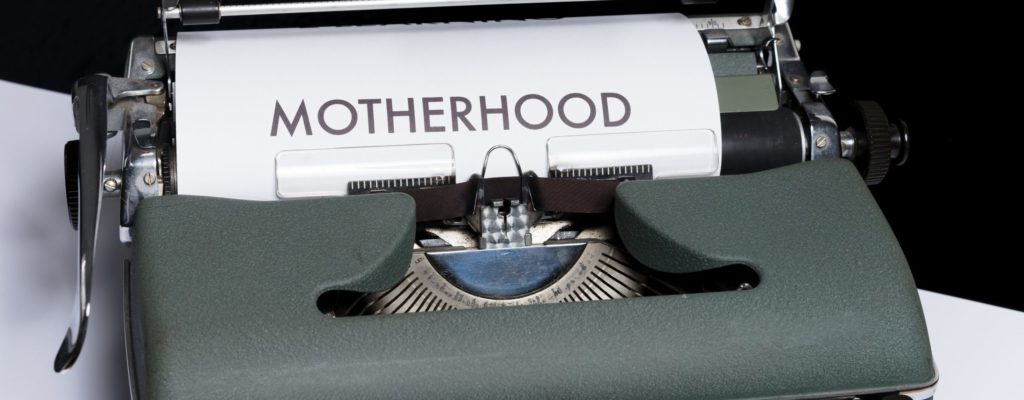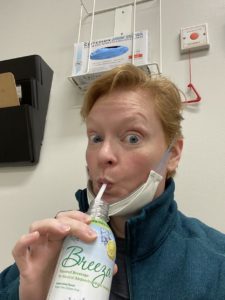IBD


Kelly sips on some Breeza contrast.
There are so many ways that we as parents show our love to our children, especially when they are ill. I remember hugging little, feverish bodies, late into the night. Helping blow toddler noses, cooking lentil soup and pouring cups of ginger ale. Parenting has a particular love language of touch and care, showing that we’re here to help them through the worst and that we can soothe with just a kiss and a murmur of comfort.
But what happens when Mom is the person who is sick? As a mother with perianal fistulizing Crohn’s disease, I have spent more days than I can count sick in bed, or monopolizing the bathroom, or at my infusion suite. I was diagnosed late in my life, after years of trying to push through increasingly severe health crises. I felt like a ghost of a parent dealing with brain fog, severe fatigue, rectal and gut pain, constant diarrhea and more. At my worst moments in health, when my anal fistulotomy surgery would not heal and I was in crippling, all-encompassing pain, every day, I was still a mom to two small children. And they needed me.
Parenting guilt is a toxic minefield, but those of us who live with chronic illness experience epic volumes of stress. I worry every time my child has a sore stomach whether or not I have passed on my genetic predisposition for Crohn’s to my children. I worry about whether they will develop obsessive anxiety about their own health. I worry about whether I’m walking the right side of the line between teaching self-reliance or pushing my children to independence too soon because, sometimes, I’m unable to meet their needs.
Will they remember the difficult days, where I wasn’t able to take them to ballet rehearsal, or we had to cancel a family vacation, all because Mom was sick? Will they resent the things they missed, all of the time and experiences they didn’t have together as a family, all because of my Crohn’s?
A very kind pediatrician once told me to put my head down and do what’s right for me and my children. For us, that was singing silly songs about Mom’s pain (“OOOOOOOoooooh, my butt hurts!” became a frequent chorus of giggles in my house with two little dancing kids shaking their booties). It was coming up with the best poop jokes ever told (“Why did the toilet paper roll down the hill? To get to the bottom!”). It was empowering my kids to make their own snacks when I was unable to leave the bathroom (all Goldfish, all the time). It was doing bedtime songs and cuddles at Mom’s bedside rather than their rooms when I wasn’t able to get out of bed.
Now that my children are older, I sometimes ask them what they remember about those terrible, difficult days. “The pillow forts in the living room that we left up for a whole month,” they say! “Curling up on the couch together and reading books all day!” Muffin tin dinners, when they could eat anything they could fit into the little muffin tins cups from the pantry and fridge, all because I couldn’t put dinner on the table. I might remember the worst of those days, but to them, the magic of those cozy, fun, silly times were all the memories that remained.
There’s nothing like time to help you shift your perspective. It may have taken years to climb my way back to good health with the help of excellent GI care and medication, but in that time, my children have grown out of the intensity of childhood and into wonderful, independent young adults. I believe strongly now that those difficult years were a gift to them. My children developed strong senses of compassion and empathy. They have learned that the most important thing in our family is to show love for each other, and ourselves. They formed a close bond with each other as well; one that still exists today.
It’s a parenting standard that you model the behavior you wish to instill in your children. In our family, we model kindness and caring. We model communicating honestly about our emotions and our physical pains and illnesses. We show our children that we listen and hear them. And eventually, as they grew, we began to see them stop and genuinely listen to us as well, no nagging required. The moment they walk up and ask me if I’d feel better with a cup of tea, and would it help if they did the dishes tonight? In those moments, I often feel my heart tighten with pride for the kind people they’ve become.

Kelly sits in a medical chair with a vitals machine behind her.
They are also lessons that are critical to teach young adults on the brink of adulthood. Consider how you wish to be treated by your loved ones. When you are in a relationship, how do you show that you care about your partner? How do you also balance the importance of valuing your own health and happiness? Teaching a child to think beyond themselves is a great gift we can give to them. To demonstrate empathy for others is an immense need in this modern world.
These days, the kids will take turns helping to pack an infusion bag for me with a blanket and snacks and iPad charger. They’ll walk quietly in the house on mornings where I’m feeling poorly. They’ll cheerfully curl up on the couch next to me and my heat pad and tell me all about their day and the newest playground games they’re playing with friends or new math units that excite them. Holding their hands when they’re coughing and sick is a little harder now that I’m on immunosuppressant medications, but I can still make them their favorite meal, and play a favorite multiplayer video game together, and let them know that they’re going to feel better soon.
The kids are going to be okay, and so am I.
